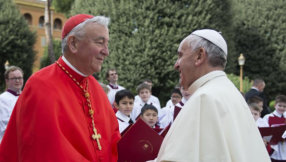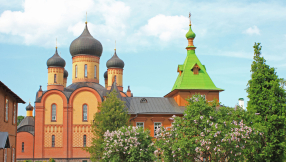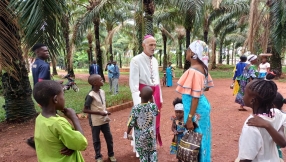
Jewish academic and Hebrew scholar Irene Lancaster explains why it is the legacy of Shem that is so necessary today.
The ten generations from Adam to Noah follow a downward spiral. Adam falls. Cain murders his brother. But people don't learn from their mistakes. So, in this week's Parsha of Noah, G-d decides to wipe out the earth. The exceptions are Noah himself, Noah's family and enough animals to replenish the earth after the impending destruction.
On this occasion, the form taken by the destruction is Flood. Later, the earth will experience fire, war, famine, and what we have all experienced in the last three years, plague. Sometimes all these modes of destruction come together, but on this occasion, Flood alone is the chosen mode.
After the flood, which Noah, his family and the animals survive, we hear about the 70 nations of the world, all descended from Noah. G-d sends the sign of G-d's pledge through the rainbow 'to the generations forever' (Genesis 9:12). The world will never again be destroyed by flood.
However the Hebrew word for 'generations' (dorot) is spelled defectively in order to demonstrate that G-d is aware that future generations may not be up to scratch, as a warning for the future.
There follows a list of all Noah's descendants from his three children, Ham, Shem and Jafet. Nimrod, the warrior, whose name actually means 'rebel', stems from the family of Canaan, son of Ham.
Chapter 11 opens with the statement that 'the whole earth was of one language and common purpose'. This contrasts with Genesis 10:5 in which the nations of the world were separated 'each according to their language, families and nations'.
So, the attempt to unify the entire world into some kind of totalitarian gigantic State appears to go against the natural order of things. According to rabbinic commentary, Nimrod, son of Canaan, son of Ham, based in what is now Iraq, plans to build a tower ascending to Heaven, from where to wage war against G-d Himself.
The Flood had recently come as a warning and wiped out the entire world bar one family. And yet Nimrod and his followers dismiss this sign as merely a fluke that won't happen again, by which time their 'war' with G-d will have been won.
G-d therefore 'descends' from on high and 'disperses' the people all over the earth. The grandiose building scheme is stopped once and for all.
'This is why it was called Babel, because it was there that the Lord confused (ballal) the language of the entire earth.' (Genesis 11: 5-9).
We then learn the names of the family of Shem, which in Hebrew means 'name'. Ham's family, Nimrod and his abettors want to make a 'name ' for themselves (Genesis 11:4) by building castles in the air in the form of the Tower of Confusion.
But at the end of the day, it is the family of Shem who will bring G-d's word to the world in the person of Abraham, the subject of the following Torah reading. But in order to do this, Abraham has to leave everything he knows. The Flood itself was not enough to stem the tide of the forces of evil in the world, and self-imposed Exile is the only way.
All this must be relevant to our own day. For three years the world has experienced a plague, now followed by war. We have been through a number of political leaders. We have experienced anarchic situations in which real leadership has been in short supply. Ordinary people have been pushed from pillar to post. We have no idea what will become of food sources, energy, prices and other material staples. Life as we have known it will never be the same again and any certainties we may have had in the past are no more.
Let us hope that governments now start to concentrate on the small things of life by renouncing all delusions of grandeur and castles in the air. Aspiration is one thing, but naked ambition is out of place and we have been warned.
The way we treat others is paramount and the prime teaching of Shem, precursor of Abraham. In contrast to Nimrod, Abraham concentrates on the little things of life, all in the name of the one G-d. The legacy of Abraham is a people and a nation devoted to G-d.
In contrast to Nimrod and ancient Babylon, Abraham's legacy and nation are still with us, seemingly indifferent to the slings and arrows hurled at them by the powers and principalities of this world.
And it is this legacy of Shem that is so necessary today: a new year, a new start, a new creation.
For, our accompanying Haftorah this week, taken from Isaiah 54:1-55:5 states the following assurance:
'For the mountains may be moved and the hills may falter, but My loving kindness shall not be removed from you, nor shall My covenant of peace falter, says the Lord, the Merciful One.'













